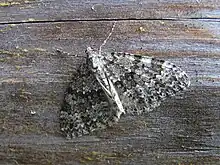| Entephria caesiata | |
|---|---|
 | |
 | |
| Scientific classification | |
| Kingdom: | |
| Phylum: | |
| Class: | |
| Order: | |
| Family: | |
| Genus: | |
| Species: | E. caesiata |
| Binomial name | |
| Entephria caesiata (Denis & Schiffermüller, 1775) | |
Entephria caesiata, the grey mountain carpet, is a moth of the family Geometridae. The species was first described by Michael Denis and Ignaz Schiffermüller in 1775. It is found in the mountainous areas of Europe (including Great Britain, Fennoscandia and the Alps), the Caucasus, Asia Minor, Armenia, Russia , Russian Far East, Siberia, northern Mongolia, Sakhalin and Honshū in Japan.[1]
The wingspan is 32–41 millimetres (1.3–1.6 in). The forewing ground colour is ash grey to blue grey. There are several dark wavy bands. The basal area and the field between the two fasciae is also darker than the ground colour. There is a black discal spot. The fringes are grey chequered dark grey. The hindwing is pale grey with pale transverse lines and a grey-black discal spot.[2] See also Prout.[3] The larva is pinkish brown on the back with yellowish-white, triangular spots, on the greenish sides.
Adults are on wing from July to September.

The larvae feed on various low heathland plants, including Calluna and Vaccinium myrtillus. Other recorded food plants include Betula species (including Betula nana), Vaccinium uliginosum, Ledum palustre and Empetrum nigrum.[4]
References
- ↑ Savela, Markku. "Entephria caesiata (Denis & Schiffermüller, 1775)". Lepidoptera and Some Other Life Forms. Retrieved May 7, 2019.
- ↑ Peder Skou, 1997 The Geometroid Moths of North Europe: Lepidoptera - Drepanidae and Geometridae (Entomonograph) Brill Archive ISBN 978-90-04-07859-8
- ↑ Prout, L. B. (1912–16). Geometridae. In A. Seitz (ed.) The Macrolepidoptera of the World. The Palaearctic Geometridae, 4. 479 pp. Alfred Kernen, Stuttgart.pdf
 This article incorporates text from this source, which is in the public domain.
This article incorporates text from this source, which is in the public domain. - ↑ Gaden S. Robinson, Phillip R. Ackery, Ian J. Kitching, George W. Beccaloni and Luis M. Hernández Database of the World's Lepidopteran Hostplants